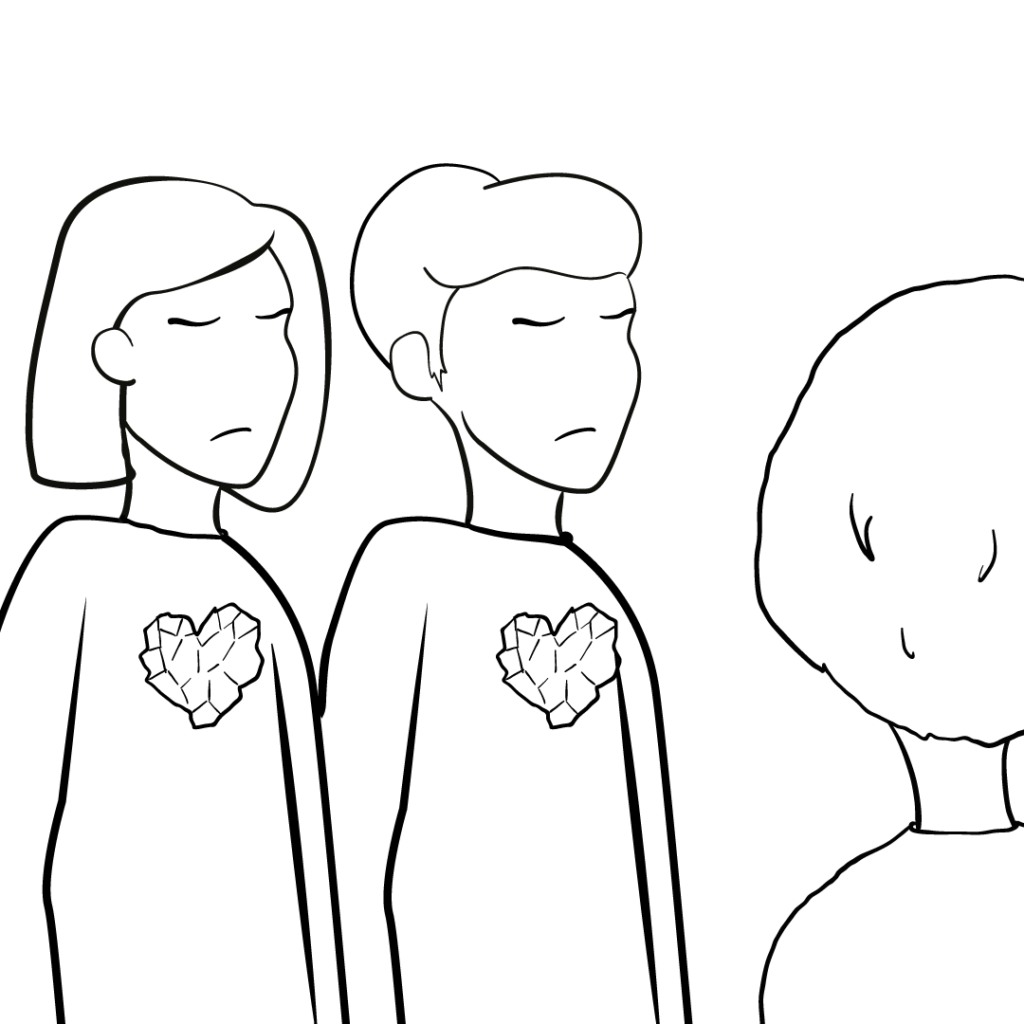RESILIENCE AS A MECHANISM FOR FACING DIFFICULTIES
Even though Kosovo is one of the countries of Europe which prohibits discrimination based on sexual orientation in the constitution, Kosovar society remains deeply traditional and even hostile towards sexual minorities. The latest research by international organizations such as UNHCR (2009, 2011) in Kosovo shows that LGBT people, who are victims of discrimination and victimization, often don’t report their cases out of fear they’ll face even more discrimination.
Illustration: Argjira Kukaj

In psychology, resilience refers to the ability of being capable of surviving and thriving towards difficulties. It includes everything that can lead to a more positive adaptation towards stress and thus reduce its negative impact in our health. So, not all people who have experienced difficulties or distress have the same reaction or experience mental health problems that come from stress and trauma at the same level. In this aspect, according to D’Augell (2002), lesbian, gay and bisexual people (LGB), especially young people, are identified as a group in psychosocial danger, by showing a weaker psychological adaptation compared to heterosexuals, especially in higher levels of depression, anxiety, substance abuse and suicidal ideation (International researchers such as Bell & Morgan, 2003; Huebner, Rebchook & Kegeles, 2004, show that the experiences of prejudice, discrimination and victimization are more noted in marginalized groups, including the community of lesbian, gay, bisexual and transgender individuals (LBT). LGBT youth are vulnerable, experiencing more bullying and victimization in school, at home, at work and at community areas. So, mental health problems have a tendency to be more widespread in younger age groups (Bybee et al., 2003). Being younger, this group is also more likely to work on challenged of going out with friends, family and work colleagues, and also to face special forms of discrimination after uncovering their sexual identity.
LGB youth are educated and operate in a society that promotes heterosexuality as the only “normal” and applicable option according to Chhesir-Teran & Hughes 2009, by simultaneously reinforcing strict gender norms that marginalize those that aren’t in accordance with the gender binary system. As a result of these social norms, LGB youth, that fall out of these normative constructs, are often a subject of violence, discrimination and marginalization, including sexual harassment and physical attacks.
Even though Kosovo is one of the countries of Europe which prohibits discrimination based on sexual orientation in the constitution, Kosovar society remains deeply traditional and even hostile towards sexual minorities.
The latest research by international organizations such as UNHCR (2009, 2011) in Kosovo shows that LGBT people, who are victims of discrimination and victimization, often don’t report their cases out of fear they’ll face even more discrimination. The Initiative of Youth for Human Rights (YIHR) non-governmental organization explains that discrimination bases on sexual orientation is “one of the least discussed aspects of human rights in Kosovo” and is “mainly left behind”, partly due to culture and traditional/conservative norms in Kosovo. By taking into consideration the different contexts in our country, negative social phenomena such as victimization, discrimination and stigmatization are very present in different environments. Facing these phenomena is often challenging, where strong coping skills are required. Consequently, resilience is considered to be the important psychological construct when an individual faces difficulty. This is also supported in the research study realized in July of the year 2019 based in the University of Prishtina, which aimed exploring resilience constructs such as; optimism, social support, emotional stability, emotional regulation, in rapport with victimization of people with different sexual orientations. From the findings of this study it’s been made clear that: Heterosexual people had the largest average in victimization, thus creating the assumption that other groups hesitated to report, something that is also proven by the YIHR study in the year 2011, where it’s said that LGBTI+ people hesitate to report cases of victimization and discrimination because of “double discrimination”. Lesbian women were both in the range of highest average of (M=61.00) in constructs of resilience, optimism, social support, emotional stability and emotional regulation in comparison to other study groups. Bisexual people also reported having high optimism and emotional regulation in comparison to other groups. This indirectly mirrors the importance of social-cultural context in this field. It also serves as a good starting point for other deeper studies. It simultaneously implies the big need of advocacy for the rights and wellbeing of different communities in Kosovo. It’s also important for there to be an investment in different initiatives that have a goal of creating awareness for the importance of psychological wellbeing among people- such as activities with a psycho-educational, informative and sensible character. Through these we can learn to care for each other in difficult cases but even after overcoming them, to work on personal and collective growth.
About the author: Fatime Rrahmani, 21 years old from Prishtina, finished her studies for psychology.


